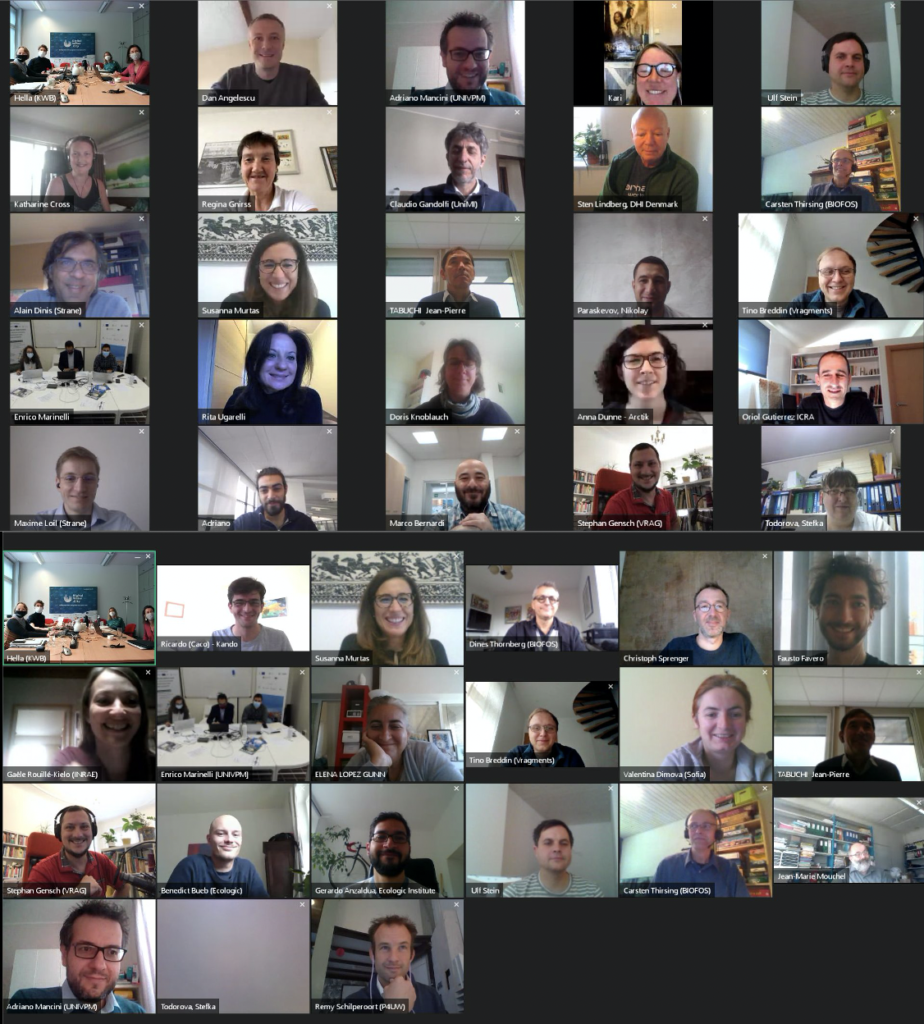On 5 and 6 October 2020, digital-water.city held its annual General Assembly. Originally planned as a physical meeting in partner city Sofia, the event ultimately went fully digital due to Covid-19 restrictions – with up to fifty participants logging in from across Europe to join two days of discussion around the project’s latest research. Preceded by work package team meetings on the morning of 5 October, the General Assembly kicked off in the afternoon with some opening words from Jochen Rabe, Director of Kompetenzzentrum Wasser Berlin (KWB) and Sotirios Kanellopoulus, project officer from the European Commission – who pointed to linkages between DWC’s research and the broader EU policy agenda around smart cities, smart homes and the emergence of a European data space.
Project coordinator Nicolas Caradot of KWB then gave an overview of where the project stands 18 months in, noting that despite the significant challenges posed by Covid-19 the DWC research is progressing full steam ahead. A presentation from guest speaker Sonia Suave, representing the Fiware4Water project, gave an insight into her team’s work to integrate the open-source Fiware platform within the water sector – highlighting the many synergies at play between DWC and sister projects like Fiware4Water within the DigitalWater2020 synergy group.
A tour of Europe’s digital water cities
Next stop on the agenda was a rapid-fire round of city pitches. Four DWC cities presented the state-of-play of research and technology trials within their urban areas. Participants learned more about the specific challenges facing the water infrastructure in each city, and how the digital solutions in development by DWC can provide answers: from tracking illicit sewer connections in Berlin, to water reuse for agriculture in Milan; and from machine learning for wastewater treatment plant management in Copenhagen, to advanced sewer cleaning and inspection tech in Sofia. The city pitches were followed by an interactive survey of participants to learn more about the transferability of the solutions in other cities – something that will be important for future development and market exploitation. Day 1 was rounded out with an update from the teams working on horizontal issues around DWC’s research: cybersecurity, market uptake, and communication.
From health protection to public engagement
The agenda on October 6 kicked off with a series of DWC solution pitches focused on health protection – a topic at the forefront of public perception in recent months, for obvious reasons. Research teams painted a rich picture of the diverse technologies in development, which range from smart sensors and early warning systems for bathing water monitoring, an early warning system for safe water reuse, and a match-making tool that connects farmers in need of water with water treatment plants that can provide it. The discussion with participants raised a number of interesting points, including the importance of stakeholder engagement and acceptance, and the need to communicate the public health benefits of such technologies to citizens.
The final session was reserved for an overview of DWC’s work around ICT governance and policy. The findings of a recent policy matrix study were presented, highlighting that digital water governance is still in its early stages across European cities, and that the EU policy framework will have a crucial role to play. Public involvement will be key to boosting awareness and acceptance of new technologies, with a number of DWC solutions designed to engage citizens in issues of water infrastructure management. Participants heard updates from the teams working on an augmented reality app for groundwater visualisation, and on a serious game that aims to inform people aged “0 to 99” on the nexus between water and sustainability.
Wrapping up the General Assembly proceedings, representatives of the DWC external Advisory Board shared their views on the progress of research 18 months in – and their thoughts on the road ahead, touching on questions of interoperability, security and trust, stakeholder acceptance, and the transition from research to the marketplace. “I have to applaud all the projects – you’re doing such exciting and important work,” commented Rebekah Eggers, board member and Busines Partnerships and Transformation Executive at IBM. “The water infrastructure is part and parcel of our daily livelihoods, and that has only been highlighted during the pandemic. Looking to how we move forward to rebuild economies in the future, there is great potential to make use of these advances in digital technology. Especially impressive is the commitment to open technologies, security-first partnerships across IT/OT, and collaboration within and across cities, sister projects, and industries.”
Follow digital-water.city on Twitter and LinkedIn for all the latest updates.

